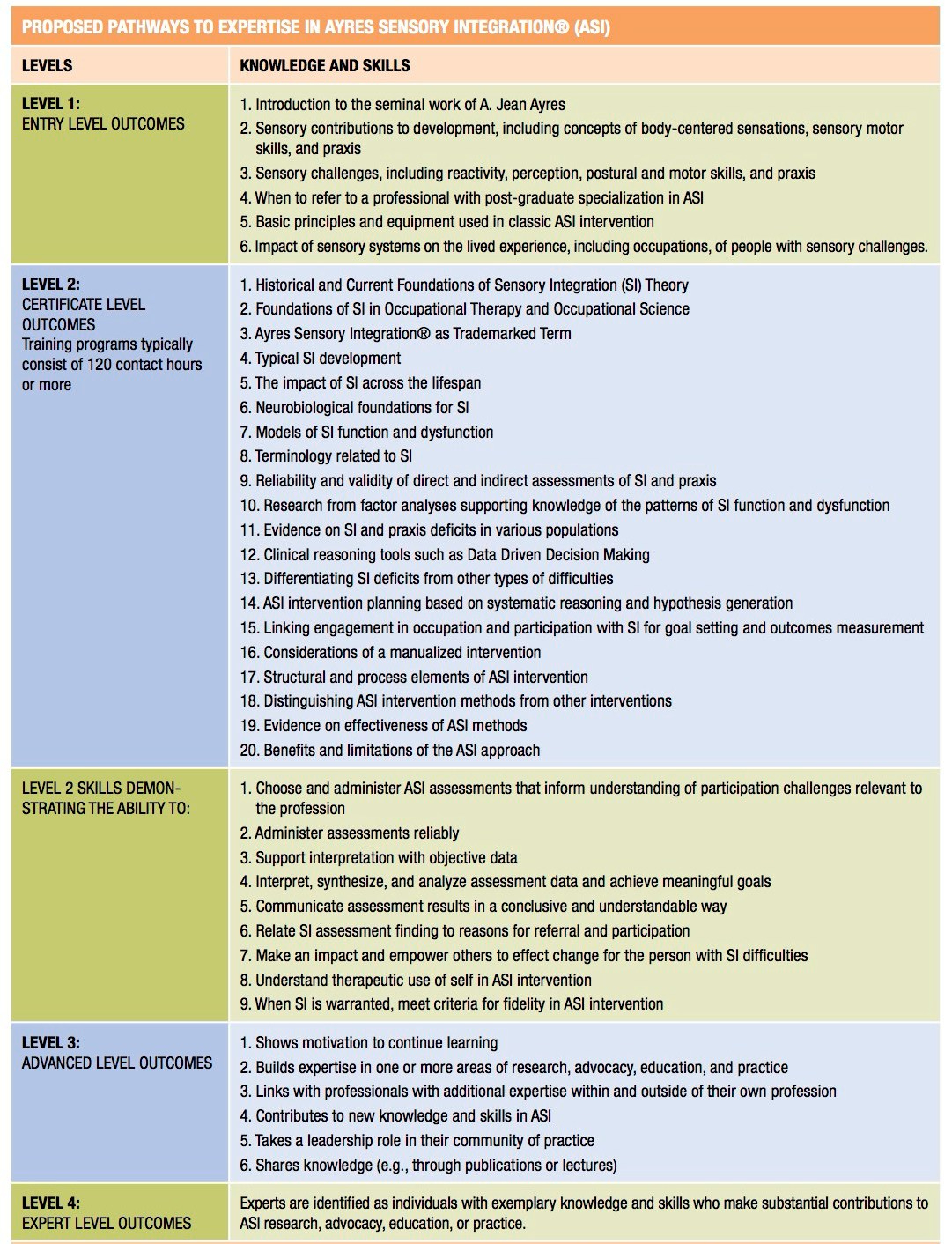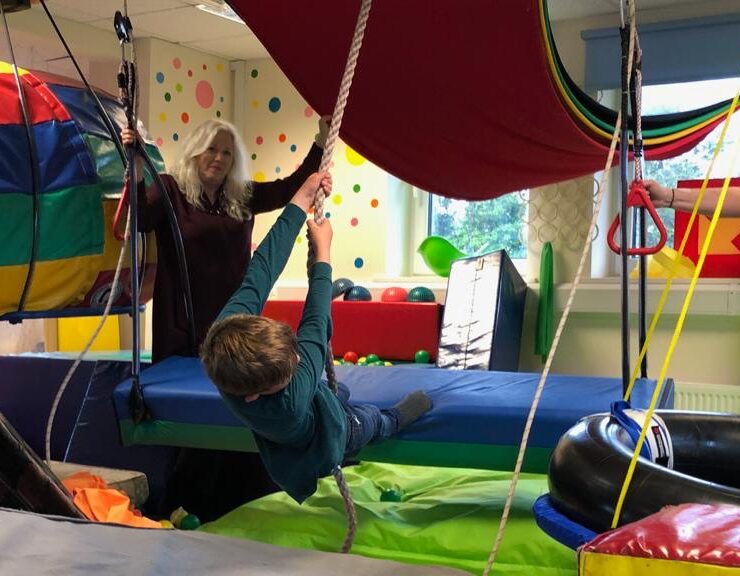Please make sure your EHCP does not specify Sensory Integration Practitioner or Advanced Practitioner, as this may rule out many expert therapists who have received training by world experts. The preferred description should be Occupational Therapist with post-graduate certification in Ayres’ Sensory Integration.
“I am an OT and I’m interested in becoming an ASI Practitioner with your programme? What does ICE-ASI Education Standards mean and is it the same as other Practitioner and Advanced Practitioner courses? What do I call myself on completion of the ASI Wise CLASI CASI Programme, Practitioner or Advanced Practitioner as some of my colleagues have done Advanced Practitioner training and can’t see the difference? Thank you. Jo.”
Hi Jo
Thank you for your question. I would suggest that you describe or sign yourself on reports as
Jo Blogs
Occupational Therapist
CLASI Certification in Ayres’ Sensory Integration. (www.iceasi.org)
This would clearly describe your profession, while also describing your training in Ayres’ Sensory Integration meeting internationally accepted ICE-ASI standards. The choice of this term by both ASI Wise and CLASI is in line with advice and guidance from professional bodies and in consideration of professional registration. Please contact RCOT for further guidance about the use of preferred terms and practice guidance for Occupational Therapists who have additional learning or post-graduate continuing professional development within the area of Ayres’ SI
The continuation of our long history and partnership with Ulster University means our ASI Wise CLASI programme is now accredited on the Ulster University post-graduate education Master’s pathway. This partnership is in line with developments within the professions OT, PT and SLT, and the terms and awards we have mindfully chosen are important and critical to our professional development in this area. .
We are delighted to be able to offer our modules as part of the MSc in Advancing Practice, with the award offered in relation to your profession eg MSc Advancing Practice (Occupational Therapy). The careful decision by our team, in discussion with Professor Suzanne Martin last year, was made with careful consideration of national developments regarding career progression for AHP’s and earlier but also current RCOT advice.
As well as having being taught by internationally published and leading works experts, this means someone receiving assessment or intervention from you would know you are trained to a standard that includes being able to deliver specialist assessment (including taught administration of standardised norm-referenced ‘gold standard’ assessment the SIPT or now the EASI – in line with international standards). The ICE-ASI international standards are helping ensure that programmes include necessary learning and requirements for the safe practice of Ayres’ SI, regardless of any often ‘unrelated’ academic accreditation. University approval of academic standards does not consider international standards and consensus regarding the practice of Ayres’ SI. It is important that therapists understand this clear distinction.
ICE-ASI standards ensure that you know and understand the neuroscience and theory, be able to provide a comprehensive specialist assessment of sensory integration and processing challenges (and strengths), including with standardised norm-referenced tools (SIPT and EASI).
Our programme meets ICE-ASI International minimum standards for learning about Ayres’ SI and ensures occupational therapists are able to use relevant tools with confidence, employing advanced clinical reasoning to develop a hypothesis to support intervention planning, delivery and measurement of progress/outcomes.

Not all terms used abroad are the same as here in the UK or Ireland. Practitioner and Advanced Practitioner in the UK refer to terms historically used and linked to a specific programme.
AHP titles are protected and regulated, so a standardised term OT/PT/SLT with Certification in ASI (ICE-ASI) is a nationally preferred and internationally recognised term by many programmes across the globe. This mindful and deliberate adoption of these terms as part of the ICE-ASI Vision from 2015, and provides a means to ensure those investing in therapy are assured of the education level of knowledge and skills of the therapist they are commissioning.
The term also allows recognition in any country of any therapist who has had training in a similar programme anywhere in the world. There have been occasions in the UK of some therapists with very adequate training eg SAISI whose education on SI Modular programmes is the same as the UK Practitioners/Advanced Practitioner were being advised that unless they retrained to the term Practitioner/Advanced Practitioner in order to practice.
Those who had historically been practising via other equal older routes have had their qualifications called into question, including in tribunal proceedings. The need to have a way of equating programmes across the globe was essential and the process to establish this began as far back as 2010.
Since then, at ICESI and later ICE-ASI international meetings, representatives from many international organisations have explored a way to establish an international standard for education in ASI. Programmes that meet criteria that have been agreed by the consensus of member organisations will equate to a therapist having learnt and applied knowledge and skills to assess, interpret and clinically reason to practice – being able to provide and reflect on intervention using the principles of Ayres’ SI.
Our Directors; Amanda Adamson, Kath Smith and Ros Urwin have been meeting up and collaborating with colleagues from across the globe at international conferences and forums representing SIN and now ASI Wise. Since 2010, they have represented ASI education in the UK and Ireland, actively contributing to the development of the learning standards. Key to their decision to establish the ASI Wise programme was national debate and discussion about terminology and professional practice issues raised by RCOT in 2015. Read more here about ICE-ASI.
Completion of ASI WISE’s CLASI CASI which meets ICEASI standards will mean therapists are grounded in, know and understand seminal theory and history of ASI and are aware of and can apply current research and evidence in practice. See ICE-ASI Standards.
This will include the ability to understand in detail, use and apply a wide range of assessment tools and methods to clinically reason how to provide intervention to anyone of any age and in any clinical setting; including how to use and interpret the current “gold standard tool” the SIPT (Sensory Integration and Praxis Test), with learning about a new test in development the EASI (Evaluation of Ayres’ Sensory Integration).
Please see our shop for more information about our modules and other workshops supporting the learning of therapists wanting to practice Ayres’ Sensory Integration. Our programme, with accreditation by Ulster University far exceeds international minimum standards with live interactive tutoring and access to a vibrant community of practice.
You can read more feedback about our workshops and courses on our pages.
